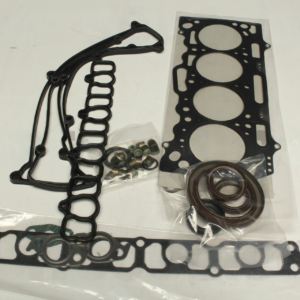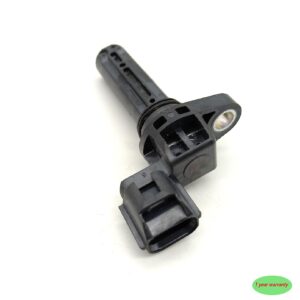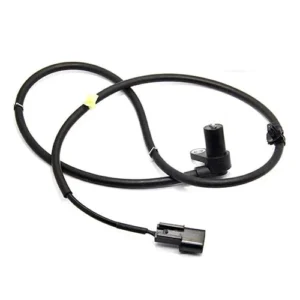Title: Engine Gaskets: The Unsung Heroes of Automotive Reliability
In the labyrinth of an automotive engine, where combustion and compression dance in perfect synchrony, there exists a network of silent guardians ensuring the integrity of its operation. Among these unsung heroes, engine gaskets stand as unassuming yet indispensable components, sealing critical junctions and pathways to maintain proper fluid and gas containment. In this blog, we’ll explore the vital role of engine gaskets, their diverse types, functions, and the crucial contribution they make to automotive reliability.
### Unveiling Engine Gaskets
Engine gaskets are flat, flexible components made from materials such as rubber, silicone, metal, or composite materials. They are strategically placed between mating surfaces in the engine to create a leak-proof seal, preventing the escape of fluids and gases while maintaining compression within the combustion chambers.
### Functions of Engine Gaskets
1. **Fluid Containment**: Engine gaskets seal the gaps between components such as cylinder heads, engine blocks, oil pans, and valve covers, preventing oil, coolant, and other fluids from leaking out of the engine.
2. **Gas Containment**: Gaskets also seal the combustion chambers, intake and exhaust manifolds, and other areas where gases are present, ensuring proper compression and preventing the escape of exhaust gases.
3. **Heat and Pressure Resistance**: Engine gaskets are designed to withstand the high temperatures and pressures present within the engine, maintaining their integrity even under extreme operating conditions.
### Types of Engine Gaskets
1. **Cylinder Head Gaskets**: Cylinder head gaskets seal the gap between the engine block and cylinder head, ensuring a proper compression seal and preventing coolant and oil leaks into the combustion chambers.
2. **Intake and Exhaust Manifold Gaskets**: These gaskets seal the connections between the intake manifold, exhaust manifold, and cylinder head, preventing air and exhaust leaks.
3. **Valve Cover Gaskets**: Valve cover gaskets seal the gap between the valve cover and cylinder head, preventing oil leaks and ensuring proper lubrication of the valvetrain.
4. **Oil Pan Gaskets**: Oil pan gaskets seal the gap between the oil pan and engine block, preventing oil leaks and ensuring proper lubrication of the engine.
### Importance of Engine Gaskets in Automotive Reliability
1. **Leak Prevention**: Engine gaskets are essential for preventing fluid and gas leaks, which can lead to loss of lubrication, overheating, and engine damage if left unchecked.
2. **Compression Seal**: Proper sealing with gaskets ensures optimal compression within the combustion chambers, maximizing engine performance and efficiency.
3. **Environmental Protection**: Engine gaskets help contain harmful emissions by sealing combustion chambers and exhaust pathways, contributing to reduced pollution and environmental impact.
### Conclusion
In the intricate tapestry of automotive engineering, engine gaskets emerge as silent sentinels, safeguarding the integrity and reliability of the engine’s operation. From sealing critical junctions to preventing fluid and gas leaks, these unassuming components play a vital role in ensuring smooth and efficient engine performance. As automotive technology continues to advance, the importance of high-quality gaskets in maintaining automotive reliability and environmental responsibility remains undeniably critical.
Only 5 left in stock (can be backordered)
$29,137.67
Title: Engine Gaskets: The Unsung Heroes of Automotive Reliability
In the labyrinth of an automotive engine, where combustion and compression dance in perfect synchrony, there exists a network of silent guardians ensuring the integrity of its operation. Among these unsung heroes, engine gaskets stand as unassuming yet indispensable components, sealing critical junctions and pathways to maintain proper fluid and gas containment. In this blog, we’ll explore the vital role of engine gaskets, their diverse types, functions, and the crucial contribution they make to automotive reliability.
### Unveiling Engine Gaskets
Engine gaskets are flat, flexible components made from materials such as rubber, silicone, metal, or composite materials. They are strategically placed between mating surfaces in the engine to create a leak-proof seal, preventing the escape of fluids and gases while maintaining compression within the combustion chambers.
### Functions of Engine Gaskets
1. **Fluid Containment**: Engine gaskets seal the gaps between components such as cylinder heads, engine blocks, oil pans, and valve covers, preventing oil, coolant, and other fluids from leaking out of the engine.
2. **Gas Containment**: Gaskets also seal the combustion chambers, intake and exhaust manifolds, and other areas where gases are present, ensuring proper compression and preventing the escape of exhaust gases.
3. **Heat and Pressure Resistance**: Engine gaskets are designed to withstand the high temperatures and pressures present within the engine, maintaining their integrity even under extreme operating conditions.
### Types of Engine Gaskets
1. **Cylinder Head Gaskets**: Cylinder head gaskets seal the gap between the engine block and cylinder head, ensuring a proper compression seal and preventing coolant and oil leaks into the combustion chambers.
2. **Intake and Exhaust Manifold Gaskets**: These gaskets seal the connections between the intake manifold, exhaust manifold, and cylinder head, preventing air and exhaust leaks.
3. **Valve Cover Gaskets**: Valve cover gaskets seal the gap between the valve cover and cylinder head, preventing oil leaks and ensuring proper lubrication of the valvetrain.
4. **Oil Pan Gaskets**: Oil pan gaskets seal the gap between the oil pan and engine block, preventing oil leaks and ensuring proper lubrication of the engine.
### Importance of Engine Gaskets in Automotive Reliability
1. **Leak Prevention**: Engine gaskets are essential for preventing fluid and gas leaks, which can lead to loss of lubrication, overheating, and engine damage if left unchecked.
2. **Compression Seal**: Proper sealing with gaskets ensures optimal compression within the combustion chambers, maximizing engine performance and efficiency.
3. **Environmental Protection**: Engine gaskets help contain harmful emissions by sealing combustion chambers and exhaust pathways, contributing to reduced pollution and environmental impact.
### Conclusion
In the intricate tapestry of automotive engineering, engine gaskets emerge as silent sentinels, safeguarding the integrity and reliability of the engine’s operation. From sealing critical junctions to preventing fluid and gas leaks, these unassuming components play a vital role in ensuring smooth and efficient engine performance. As automotive technology continues to advance, the importance of high-quality gaskets in maintaining automotive reliability and environmental responsibility remains undeniably critical.
| Warehouse | Inventory at warehouse 2 |
|---|



Get E-mail updates about our latest products and special offers.
Sensors and More is Jamaica’s ultimate online auto parts store. Established in 2020, we specialize in genuine electrical parts for Japanese, Read more…
Reviews
There are no reviews yet.